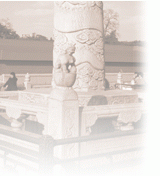| Reality Check for China's Manned Space Ambitions |
| 2004-06-12 15:28 |
|
Chinese New Year celebrations here have nearly been
overshadowed by saturation news coverage of the space
shuttle Columbia disaster, reflecting China's growing
obsession -- and new found worries -- with space exploration
as they count down to the country's first manned space
mission. China is on the threshold of becoming the third country to send its own astronauts into orbit later this year, officials declared after the Shenzhou IV spacecraft successfully returned to earth on Jan 5. But the groundswell of public excitement over the country's decade-long space program took a reality check over the weekend, when images of space shuttle Columbia breaking up over central Texas were repeatedly shown on television news programs and splashed on the front pages of newspapers here. Stark images of shattered space shuttle parts, a helmet belonging to the doomed crew of Columbia, and recovery of their burnt remains drove home in no uncertain terms for ordinary Chinese that the country's ambitions in space came with huge risks. The point is not lost on the media here. Aside from publishing lengthy reports examining the Columbia disaster, newspapers also sought to address domestic concerns with reassuring front-page reports headlined “China's Manned Space Mission Will Not Be Affected” and “Space Exploration Efforts Will Not Suffer Setbacks.” These reports have sidelined the cheery reports of Chinese New Year festivities around the country and congratulatory messages from the top leaders, which are de rigueur at this time of the year. “The risks involved in space missions are so unpredictable, so it's understandable that some of our readers are concerned about China's own space program after what happened to Columbia,” said Mr An Shiying, an editor with the foreign desk of the popular Beijing Youth Daily. Public interest in the Columbia disaster has been intense, if the number of Internet postings and mobile phone text messages are anything to go by. Millions who sent text greetings via their mobile phones during the Chinese New Year also spread word of the Columbia incident to friends. Popular news portal Sina.com estimated that over 100,000 text messages on the subject were sent within just 10 minutes of the incident. The news portal also received 5,000 postings on its message board within the first 12 hours of the disaster. Following President Jiang Zemin's declaration that humanity should “make further progress in space exploration despite the setback,” state media trotted out one Chinese space expert after another to examine the Columbia incident and its implications for China. The unanimous message: China will not -- and should not -- abandon its plans to send its own astronauts into space. The country should instead learn from the tragedy and push ahead with its space program. Experts were also quick to point out that China's spacecrafts are not reused, unlike the United States' space shuttles. State news agency Xinhua quoted astronautics expert Min Guirong, of the Chinese Academy of Sciences, as saying that China has no plans to develop spaceships that could be reused, because it was not as economical as expected. Asked what would happen if China's manned space mission met a similar fate as Columbia, independent space expert Chen Lan said: “There definitely would be a huge outpouring of public sympathy and grief, but like the Americans, we would not give up our space program. “The pace of space exploration is simply unstoppable.” (China Daily February 6, 2003) |
|
||||||||||
 |
||||||||||
|
| ||||||||||
|
| ||||||||||
 | ||||||||||
 | ||||||||||
 |
| Home > News | |
|
|
|